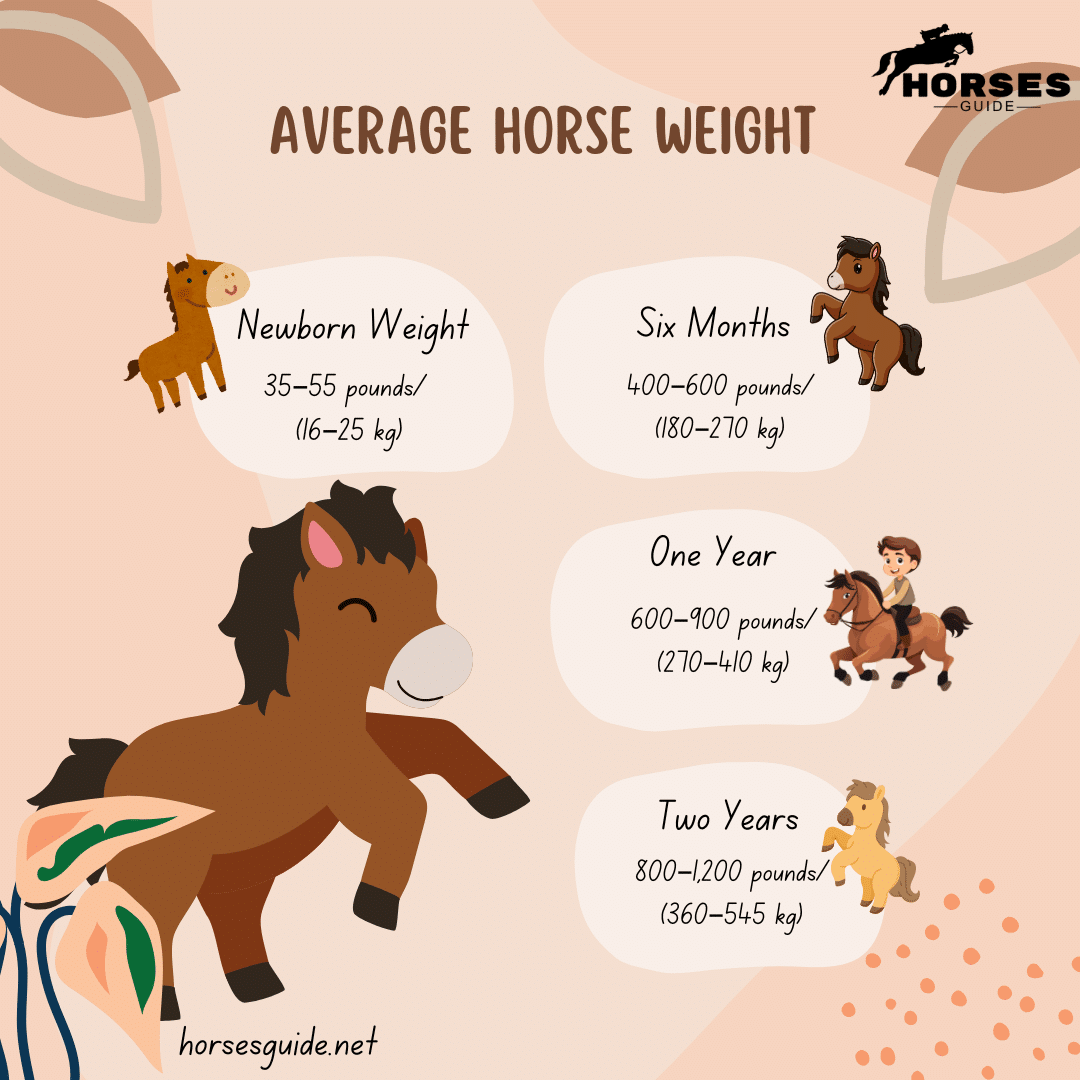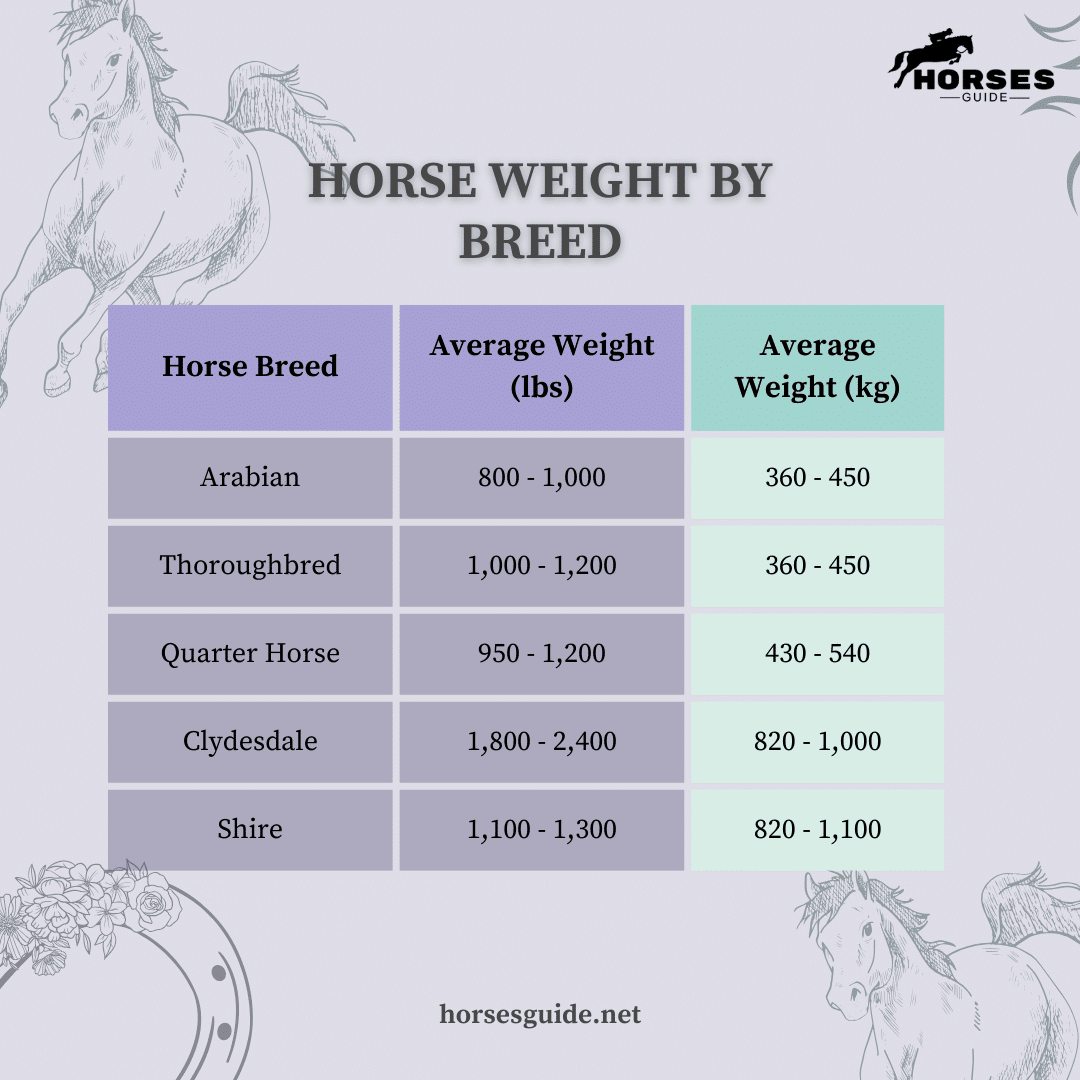Table of Contents
Nobody wants an underweight or overweight equine companion; it’s all about finding that perfect balance. Imagine your horse galloping with energy, shining with health, and ready to take on any challenge. Achieving this means understanding the importance of ideal horse weight. Folks, if you are new to the world of horses, knowing how to keep your equine partner in top shape is key. We have rounded up an article guide covering the nuances and intricacies of an average horse weight.
Weight of a Foal

Well, I have decided to discuss the intricacies of a horse’s weight by starting with a baby horse. Imagine a little foal wobbly on its legs, growing stronger by the day! 🐴 With each meal and a lot of play, these young horses pack on the pounds quickly.
Let’s talk about how fast foals grow and the weights they reach along the way:
- Newborn Weight: Foals start small, weighing around 35–55 pounds (16–25 kg) right at birth.
- Factors at Play: Birth weight varies by breed, mom’s health during pregnancy, and genetics.
- Rapid Growth: These little ones grow fast! By six months, they reach around 400–600 pounds (180–270 kg).
- One Year Milestone: By their first birthday, foals typically weigh in at a healthy 600–900 pounds (270–410 kg), depending on their breed and nutrition. That’s a lot of growing in just a year!
- Two-Year Checkpoint: Around age two, most foals have hit about 75% of their adult weight, often ranging between 800–1,200 pounds (360–545 kg). They’re well on their way to becoming strong adult horses!
Weight of an Adult Horse
Adult horses come in all sizes! From hefty draft horses to petite ponies, their weights can vary widely depending on breed and height.
- Weight Range by Breed: Adult horses can weigh anywhere from 900 to 2,200 pounds (410 to 1,000 kg), depending on breed and size.
- Height-to-Weight Ratio: Horse weight often aligns with height, measured in “hands” (1 hand = 4 inches).
Here’s the breakdown:
- Large Breeds: Clydesdales and Shires can exceed 2,000 pounds!
- Medium Breeds: A 16-hand horse often weighs between 1,000 and 1,500 pounds.
- Small Breeds: Shetland Ponies and other smaller types generally weigh under 900 pounds.
Horse Wight by Breed
You can gain insights about the weight of horses categorized by breeds in the table below:

Ways to Determine a Horse’s Weight
Folks, precise weight measurements are essential for planning diets, giving medications at the right doses, and keeping an eye on general health in horses. Horse weight can be determined in a number of ways:
Weight Tape
A weight tape is one of the most popular and practical tools for estimating a horse’s weight. This tape is put around the horse’s girth, or the space just behind its front legs, and is marked with weight measures. Weight tapes are a reasonably decent estimate, even though they are not perfect, especially for averagely-built horses. For the most precise results when using a weight tape, it’s crucial to measure the girth at the point of the shoulder and to take measures in inches.
Weighbridge or Livestock Scale
Horse weight can be most accurately measured with a livestock scale or weighbridge. These scales offer an accurate measurement and are made to handle huge animals. But since they’re usually located at large stables or veterinary clinics, individual horse owners might find them less accessible.
Formula for Mathematics
Another approach is to estimate weight using a mathematical calculation. A typical formula is:
Weight (lbs)= 330Girth (inches)2×Body Length (inches)
The horse’s girth and body length must be measured precisely in order to use this procedure, which yields a reliable estimate. It might be quite beneficial to take these measures accurately by using a measuring stick.
Factors Affecting the Weight of Horses
Numerous factors, such as breed, age, food, and health status, can affect a horse’s weight. It is essential to comprehend these elements in order to properly manage a horse’s weight.
Type
Breed largely determines weight, with draft horses generally heavier than light breeds and ponies lighter than both.
Age
Horses gain weight rapidly as foals, maintain stable weight as adults, and may lose weight with age due to slower metabolisms or dental issues.
Nutrition
A balanced diet is key. High-calorie diets without exercise can lead to weight gain, while underfeeding affects health and performance.
Exercise
Regular activity helps maintain a healthy weight. Balanced exercise prevents weight gain or loss due to muscle changes.
Health Condition
Digestive, dental, or metabolic issues can cause weight loss, while conditions like Cushing’s disease might lead to weight gain.
Final Words
Coming to an end, the article covered details on horse weight for accurate measurement. If you own a horse or are planning to invest in one, it’s important to gain insights about the ideal weight along with the needed nutrition. This is because it would be your way to make your equine partner happy.



